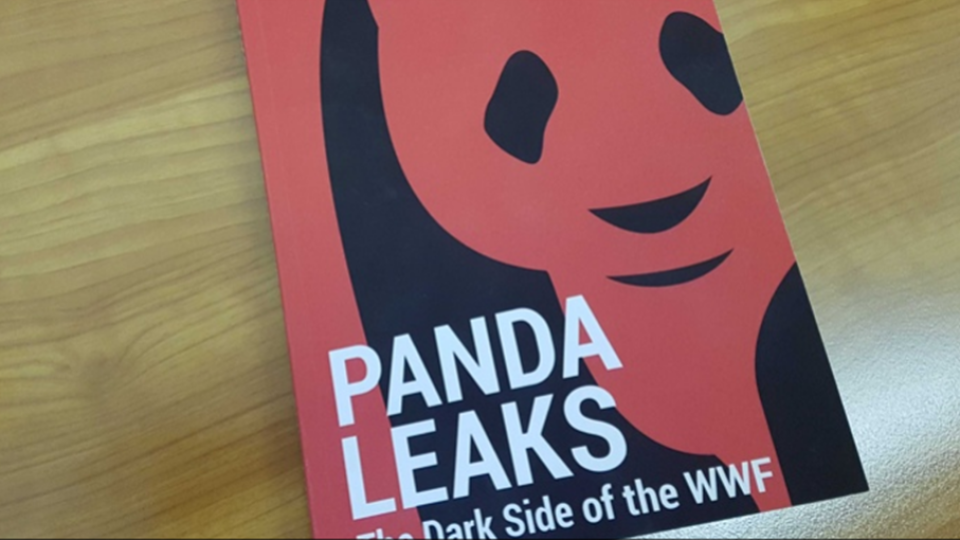The environmental organisation, WWF, is supposedly an instrument for policing the environmental crimes of corporations which are destroying the last surviving rainforests. It has been said, however, that they are damaging nature more than caring for it. These are just some of the findings disclosed in the new edition of ‘Pandaleaks, the Dark Side of WWF’ by Wilfried Huismann. The best-selling German author and journalist, Wilfried Huismann, is also involved in investigatory journalism, principally for television and radio stations. Over time, he has become one of the most respected and successful producers of documentary films in Germany. In recent years, he has also started to write film and TV scripts, including the well-known crime series Crime Scene. Huismann is the winner of three prestigious Grimm Awards, and of numerous other international awards. Lately, Huismann has explored thoroughly, the early history of the influential World Wide Fund for Nature (WWF) and has found "several skeletons in the cupboard". These include the elite secret club known as Club 1001 and the private military club in Africa which takes action, not only against the big game poachers, but also against liberation movements of the black population. In the name of protecting the environment, WWF takes part in the expulsion of indigenous people from places all over the world. So, the business model that the WWF follows could actually be doing more harm than good! WWF cannot deny the facts gathered by the respected journalist and film editor, Husimanm, during his two-year investigation into every part of the "Green Empire". Taking a trip for investigative journalistic purposes, he is ingenuous in revealing the dark secrets behind WWF's hidden façade. At the beginning of Pandleaks Huismann cites the words of New York Times journalist, Raymond Bonner, "It's easier to penetrate the CIA than the WWF."  Established in 1961, WWF was initially just a small protest movement. From the very beginning, however, it succeeded in becoming part of the global social elite. Club 1001, established in 1971 by the then-president of WWF, the Dutch Prince of German origin, Bernhard, is a part of the fund. He remained number one in the organisation until his death in 2004, at the age of 93. Currently, the identities of the remaining 1,000 members of Club 1001, still remain shrouded in mystery.Only a few names have been disclosed over the years: Henry Ford, Baron von Thyssen, Muslim billionaire and spiritual leader Prince Aga Khan, Prof. Bernhard Grzimek, USA military minister Robert McNamara, Fiat boss Gianni Agnelli and many members of European royal families. It is a union of money, blood relationships and the political elite. Club 1001 provides funds for salaries and supports the International Fund's Central Secretariat located in Gland, Switzerland, on Lake Geneva. This allows the international leaders to take actions independently of the WWF's 90 national branches worldwide. The WWF's annual ball, and other discreet social events, provide a good opportunity to discuss the strategic focus of the world's largest nature conservation organisation. While not exactly WWF's secret command centre, Club 1001 is certainly a long-standing network with significant influence on the global corporate authorities and policy-makers. In the 1980s, WWF decided to become more than a nature conservation organisation and started to advocate the big wild animals loved by all of us. Taking on this new environmental task, the organisation started to protect the natural world from the major evils of our time. In his speech, on the occasion of the 20th anniversary of the Fund, the founder Max Nicholson, specifically characterised the enemy: relentless and harmful technological development; wastage of the world's available energy resources and out of control animal reproduction, likened to that of rabbits! The sad truth is that someone has to deal with these three large unpleasant tasks and, said Mr. Nicholson, “if we don’t, then who will?” At the time the fund was headed by the UK’s Prince Philip (1981-1996.) The organisation soon grew into a world-wide nature conservation structure which now regularly collaborates with global corporations. Panda, the WWF emblem, is "sold" to those who generate profit for the organisation. Soon a joint strategic project called "green economy" was born. However, to understand the WWF political role, a thorough analysis of British Empire catacombs and the loss of almost all African colonies in the 1950s and 1960s should be made. Africa is the birthplace of the WWF. The prologue to its history began in 1940, when Great Britain announced that the Serengeti would be the first national park in East Africa, a region as large as Northern Ireland. The colonial authorities made the plan acceptable to London thanks to two main arguments. There were no significant mineral deposits there and the land was not attractive to European settlers due to the insufficient rainfalls and the presence of too many Tsetse flies! That is why the Serengeti could become a major world tourist attraction. The only problem is the Maasai people, the indigenous tribes who have lived there with their flocks for centuries. The British decided to grant them the right to stay because they did not farm the land and did not hunt protected animals. The Maasai were pleased about this, but at that time they did not know how Western environmentalists and the white rangers in the park, who hated the locals, would treat them. Amazingly, many of the tourists also complain about the sight of the "dirty" Maasai and their barbaric way of life! In the 1950s, the colonial authorities introduced a new policy and offered the Maasai an opportunity for voluntary resettlement. The tribal chieftains, however, rejected the offer. The environmentalists increased the pressure, causing the Tanganyika colonial administration to take a ‘Solomon's decision’/ Serengeti National Park would be reduced from 5,000 to 1,800 square miles, and the Maasai would have to leave it! A storm of protests blew up in Europe and the United States. The storm soon became a tornado for the British colonial authorities, when the German environmentalist, Bernhard Grzimek, joined it. He showed the world how a radical PR campaign could lead to policy shifts. Through its mission in Serengeti, the famous director of the zoo in Frankfurt, became an ideological role model for modern nature protection and the WWF. BGNES Agency
Established in 1961, WWF was initially just a small protest movement. From the very beginning, however, it succeeded in becoming part of the global social elite. Club 1001, established in 1971 by the then-president of WWF, the Dutch Prince of German origin, Bernhard, is a part of the fund. He remained number one in the organisation until his death in 2004, at the age of 93. Currently, the identities of the remaining 1,000 members of Club 1001, still remain shrouded in mystery.Only a few names have been disclosed over the years: Henry Ford, Baron von Thyssen, Muslim billionaire and spiritual leader Prince Aga Khan, Prof. Bernhard Grzimek, USA military minister Robert McNamara, Fiat boss Gianni Agnelli and many members of European royal families. It is a union of money, blood relationships and the political elite. Club 1001 provides funds for salaries and supports the International Fund's Central Secretariat located in Gland, Switzerland, on Lake Geneva. This allows the international leaders to take actions independently of the WWF's 90 national branches worldwide. The WWF's annual ball, and other discreet social events, provide a good opportunity to discuss the strategic focus of the world's largest nature conservation organisation. While not exactly WWF's secret command centre, Club 1001 is certainly a long-standing network with significant influence on the global corporate authorities and policy-makers. In the 1980s, WWF decided to become more than a nature conservation organisation and started to advocate the big wild animals loved by all of us. Taking on this new environmental task, the organisation started to protect the natural world from the major evils of our time. In his speech, on the occasion of the 20th anniversary of the Fund, the founder Max Nicholson, specifically characterised the enemy: relentless and harmful technological development; wastage of the world's available energy resources and out of control animal reproduction, likened to that of rabbits! The sad truth is that someone has to deal with these three large unpleasant tasks and, said Mr. Nicholson, “if we don’t, then who will?” At the time the fund was headed by the UK’s Prince Philip (1981-1996.) The organisation soon grew into a world-wide nature conservation structure which now regularly collaborates with global corporations. Panda, the WWF emblem, is "sold" to those who generate profit for the organisation. Soon a joint strategic project called "green economy" was born. However, to understand the WWF political role, a thorough analysis of British Empire catacombs and the loss of almost all African colonies in the 1950s and 1960s should be made. Africa is the birthplace of the WWF. The prologue to its history began in 1940, when Great Britain announced that the Serengeti would be the first national park in East Africa, a region as large as Northern Ireland. The colonial authorities made the plan acceptable to London thanks to two main arguments. There were no significant mineral deposits there and the land was not attractive to European settlers due to the insufficient rainfalls and the presence of too many Tsetse flies! That is why the Serengeti could become a major world tourist attraction. The only problem is the Maasai people, the indigenous tribes who have lived there with their flocks for centuries. The British decided to grant them the right to stay because they did not farm the land and did not hunt protected animals. The Maasai were pleased about this, but at that time they did not know how Western environmentalists and the white rangers in the park, who hated the locals, would treat them. Amazingly, many of the tourists also complain about the sight of the "dirty" Maasai and their barbaric way of life! In the 1950s, the colonial authorities introduced a new policy and offered the Maasai an opportunity for voluntary resettlement. The tribal chieftains, however, rejected the offer. The environmentalists increased the pressure, causing the Tanganyika colonial administration to take a ‘Solomon's decision’/ Serengeti National Park would be reduced from 5,000 to 1,800 square miles, and the Maasai would have to leave it! A storm of protests blew up in Europe and the United States. The storm soon became a tornado for the British colonial authorities, when the German environmentalist, Bernhard Grzimek, joined it. He showed the world how a radical PR campaign could lead to policy shifts. Through its mission in Serengeti, the famous director of the zoo in Frankfurt, became an ideological role model for modern nature protection and the WWF. BGNES Agency
Wilfried Huismann: The Dark Side of the World Wide Fund for Nature (WWF)












